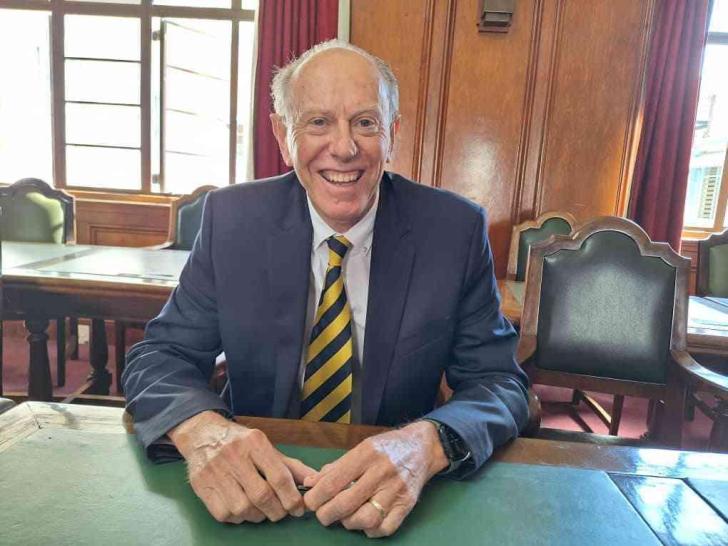News / National
Coltart appears opposed to slashing of parking charges
11 Sep 2025 at 14:42hrs |
7 Views

Bulawayo mayor David Coltart has voiced concern after the government ordered local authorities to cut parking, clamping and tow-away fees by half, a decision warmly received by residents but one he says will further strain municipal finances.
Cabinet announced on Tuesday that parking fees would drop from US$1 to 50 cents per hour, while clamping penalties and tow-away charges would also be reduced. Finance minister Mthuli Ncube said the measures were part of a broader review aimed at easing the cost of doing business, which also included slashing the cost of vehicle number plates from US$500 to US$50.
While residents cheered the announcement, Coltart warned the directive would deprive already cash-strapped councils of critical revenue. Writing on X, he said: "The reality of this measure, combined with the tax on commuter taxis, is that less money will now come to urban councils and more money will go to central government."
Bulawayo has, since 2022, been locked in an unpopular public-private partnership with Tendy Three Investments (TTI), which manages parking in the city centre. Under the deal, motorists are charged US$1 an hour for parking, while improperly parked vehicles attract penalties of US$40 - including a US$10 "clamping fee." The city retains just 30 percent of the revenue, with TTI taking 70 percent.
Between January and May last year, TTI remitted just over US$1.5 million to the council. Its own share of earnings for the same period was more than double that. The six-year contract, awarded in 2020 but only implemented in 2022, runs until December 2027 with an option for a four-year extension.
The arrangement has long angered Bulawayo residents, many of whom have demanded its cancellation, calling it exploitative. Coltart himself campaigned for mayor on a promise to review the contract.
His criticism of the new fee structure drew sharp reactions online. Zimbabwe Media Commission commissioner Aleck Ncube wrote on X: "If @CityofBulawayo is getting 25 cents per dollar, it can still get its share from the reduced parking fees. Why have an agreement which favours some private entity which invested absolutely nothing in the first place? … The public outcry has been loud and clear. Kudos to central government for listening."
Another user weighed in: "So many people now avoid parking within the CBDs. Most formal businesses are running from the CBDs to the outskirts and we need to stop seeing fines as revenue lines."
With residents welcoming the relief but the city fretting over lost revenue, the government's intervention appears set to intensify debate over Bulawayo's controversial parking deal and the future of municipal financing.
Cabinet announced on Tuesday that parking fees would drop from US$1 to 50 cents per hour, while clamping penalties and tow-away charges would also be reduced. Finance minister Mthuli Ncube said the measures were part of a broader review aimed at easing the cost of doing business, which also included slashing the cost of vehicle number plates from US$500 to US$50.
While residents cheered the announcement, Coltart warned the directive would deprive already cash-strapped councils of critical revenue. Writing on X, he said: "The reality of this measure, combined with the tax on commuter taxis, is that less money will now come to urban councils and more money will go to central government."
Bulawayo has, since 2022, been locked in an unpopular public-private partnership with Tendy Three Investments (TTI), which manages parking in the city centre. Under the deal, motorists are charged US$1 an hour for parking, while improperly parked vehicles attract penalties of US$40 - including a US$10 "clamping fee." The city retains just 30 percent of the revenue, with TTI taking 70 percent.
Between January and May last year, TTI remitted just over US$1.5 million to the council. Its own share of earnings for the same period was more than double that. The six-year contract, awarded in 2020 but only implemented in 2022, runs until December 2027 with an option for a four-year extension.
The arrangement has long angered Bulawayo residents, many of whom have demanded its cancellation, calling it exploitative. Coltart himself campaigned for mayor on a promise to review the contract.
His criticism of the new fee structure drew sharp reactions online. Zimbabwe Media Commission commissioner Aleck Ncube wrote on X: "If @CityofBulawayo is getting 25 cents per dollar, it can still get its share from the reduced parking fees. Why have an agreement which favours some private entity which invested absolutely nothing in the first place? … The public outcry has been loud and clear. Kudos to central government for listening."
Another user weighed in: "So many people now avoid parking within the CBDs. Most formal businesses are running from the CBDs to the outskirts and we need to stop seeing fines as revenue lines."
With residents welcoming the relief but the city fretting over lost revenue, the government's intervention appears set to intensify debate over Bulawayo's controversial parking deal and the future of municipal financing.
Source - zimlive
Join the discussion
Loading comments…


































